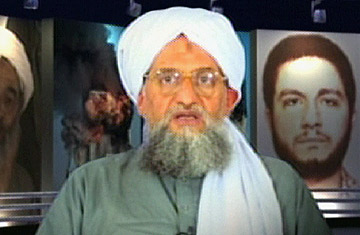
Al-Qaeda leader Ayman al-Zawahiri in a 2006 video recording
(2 of 2)
Al-Zawahiri was also involved in a trap against the CIA. A Jordanian "mole" planted by the CIA inside al-Qaeda promised to reveal al-Zawahiri's whereabouts in December 2009. Instead, the Jordanian turned out to be a triple agent, an unrepentant jihadi and suicide bomber, who blew up a high-level CIA team at a secret base near Khost, in eastern Afghanistan. Five CIA officers and two security men were killed and a dozen others were wounded in the bombing, the worst disaster to befall the agency in over 30 years. A U.S. official told TIME that al-Qaeda leaders had "knowledge of the operation and encouraged it." And the bait had been al-Zawahiri.
Questions have arisen over whether Pakistan's all-powerful military knew where bin Laden was holed up. But there's little doubt that, had the Pakistanis known where al-Zawahiri was hiding, they would have gladly hunted him down. Bin Laden, according to his biographer Michael Scheuer, an ex-CIA officer, had "close ties with ISI [Pakistani intelligence] up to and including generals" before 9/11. But al-Zawahiri had a phobia of military men, acquired during his years inside the prisons of the Egyptian regime.
Soon enough, al-Zawahiri's suspicion of the Pakistani army turned to hostility. In a September 2003 video harangue, the Egyptian terrorist urged Pakistanis to rise against the generals. Three months later, President Pervez Musharraf narrowly escaped two attempts on his life. Counterterrorism experts in Islamabad also claim al-Zawahiri was involved in the December 2007 assassination of ex-Prime Minister Benazir Bhutto. And U.S. officials say the Egyptian maintains close ties with Hakimullah Mehsud, leader of the Pakistani Taliban, which has launched a suicide-bombing campaign against Pakistani troops in the tribal territory bordering Afghanistan.
The CIA and the Pakistanis had plenty of near misses with al-Zawahiri. He was sighted in February 2003 with Khalid Sheikh Mohammed, a day before the alleged mastermind of the 9/11 attacks was captured in Rawalpindi in a joint raid by Pakistani and American forces. A year later, al-Zawahiri supposedly escaped with minor injuries after the Pakistani air force, following a tip-off from an informant, bombed a farmhouse in South Waziristan. The trail went cold for two years, until American intelligence got wind of a dinner feast for al-Qaeda's leaders north of the Khyber Pass. Predator missiles struck the gathering, killing 18 people. Al-Zawahiri was supposed to be among them, but apparently bowed out at the last minute.
But al-Zawahiri's hunters may have again picked up the trail. Using intelligence gleaned from computer files seized in bin Laden's Abbottabad safe house, U.S. officials say they may be closer to finding al-Zawahiri and other surviving al-Qaeda leaders.
Meanwhile, the situation may get complicated in Afghanistan if the U.S. and Afghan President Hamid Karzai choose to broker cease-fire talks with the Taliban, al-Qaeda's longtime ally. Both the Taliban and al-Qaeda hate the U.S., but they have divergent goals. It's al-Qaeda's strategy to keep the U.S. tied down in Afghanistan, while the Taliban wants to drive out the "infidel" American and NATO troops. Afghanistan, says Semple, has "turned into a giant film studio for al-Qaeda propaganda." He adds, "They want to keep America embroiled in the conflict." And so, if Karzai wants to reach a settlement with the Taliban, expect al-Qaeda to come between their erstwhile ally and the Afghan government, especially now that al-Zawahiri is running the show. — With reporting by Ranya Kadri/Amman
McGirk, a former TIME bureau chief, is currently a fellow at University of California, Berkeley's Investigative Reporting Program.
